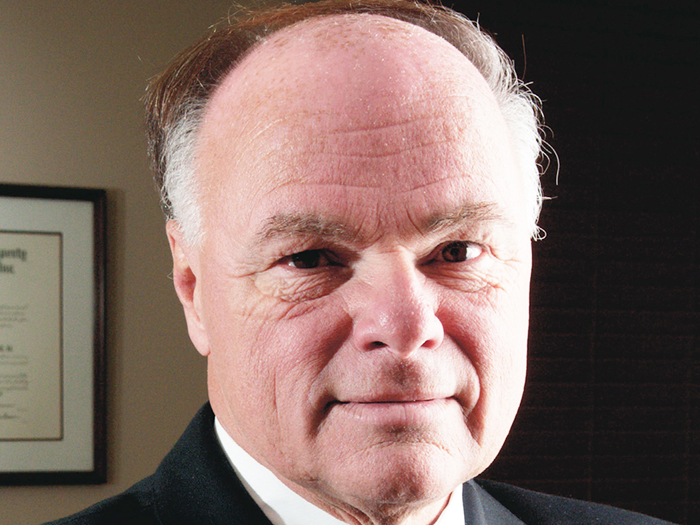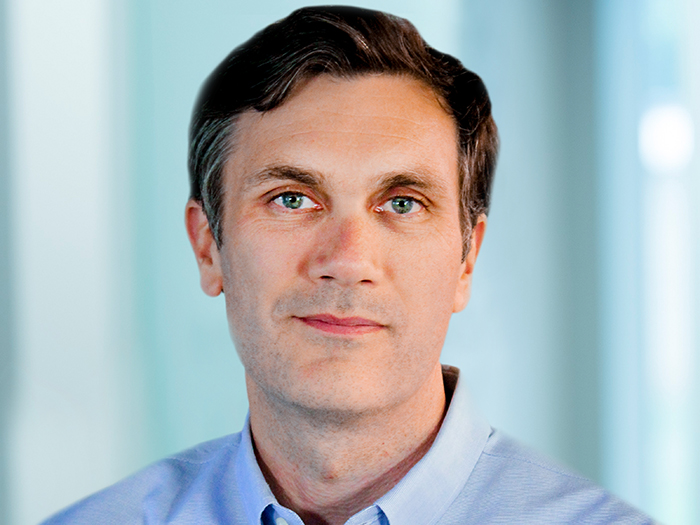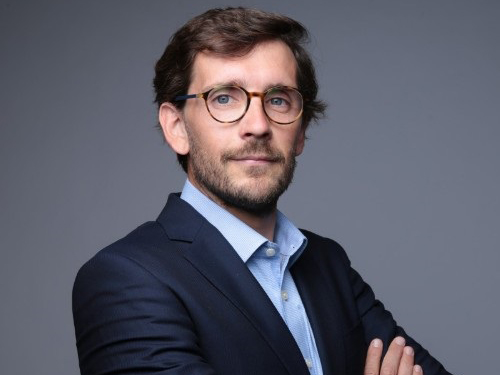8 Questions for Rockwood Program’s Glenn Clark

In February, Rockwood Programs owner and president Glenn Clark sat down with Risk & Insurance to share industry insights from his 40 years as an insurance veteran and serial insurance entrepreneur.
Prior to the launch of Rockwood Programs, Clark held executive-level positions with AIG, INA and Allstate.
In addition, he is the founder of the Target Markets Program Administrators Association, which he later sold. Recently, in conjunction with Fortegra Insurance, Rockwood Programs introduced Patrol Protect, a liability cover for police officers who moonlight to pick up extra income.
What follows is a transcript of the interview with Clark, edited for clarity and brevity.
Risk & Insurance: Looking at your business, what opportunities in the coming year are you most excited about?
Glenn Clark: We are a niche player. Rockwood Programs only does management and professional liability. We are program administrators, with the pen [underwriting authority] from several carriers, including Lloyd’s of London and Fortegra.
In 2009, we bought an agency called Wright USA in a joint venture with Ironshore. Wright USA insured federal government employees for their career protection. So, just as you and I insure our businesses against being sued, they’re insuring the asset they possess — their careers, pensions, etc.
After 20 years with the federal government, they’re going to get a pension for the rest of their life. They cannot afford to have that employment interrupted, downgraded or anything like that. Mr. Wright, who has since passed away, invented this product where if you get accused of something in your employment, we’ll come in and help defend you against your own employer.
We thought his idea was fantastic. Due to insufficient finances, we ended up doing a joint venture with Ironshore Insurance Company.
So, as I said earlier, we found a partner and then bought the agency. We owned 40% of it and ran it. And we basically learned how civil employees feel about their employer. They don’t quite trust them to represent them as well as private insurance. The only thing available to employees was the city’s insurance, which is usually the same program representing an accuser.
That’s where the original idea was born to take the federal concept into an expanded niche of state and municipal civil government. Ten years ago, we were ahead of our time and we ran into roadblocks. Quite frankly, the municipal decision tree was too long and too political to conquer at the time given that we were a small group.
This product [Patrol Protect] was built because of something we learned 10 years ago. And in 2020 we thought, given the recent news, our timing may be right now. Let’s just start this time by making a real base entry-level product to test the waters.
We know from our research that more than 40% of all police officers moonlight. Moonlighting happens is all 50 states (whether it is pre-approved by the local authority or not). Law enforcement is not a highly-paid profession. We figure, we can’t charge too much for this. We have to limit the exposures that an insurer will cover. The application is self-underwriting. If you can say yes to a certain group of questions, you won’t be excluded. But if you have to say “no” to one of them, you must be reviewed and underwritten.
Patrol Protect is not trying to reach the general public. It is designed to reach a specific niche: police, sheriffs, constables, etc. Professionals in law enforcement.
R&I: One sees a lot of growth in programs overall. But what are some of the challenges you see in your business overall?
GC: The biggest challenge for small program administrator would be: What actually makes you unique?
Do you have a better price, which is an anathema to the carriers, or a better form, or better delivery vehicle? Typically, Rockwood has played in the initial buyers arena. Do I buy this insurance or don’t I? Rockwood is not normally competing with larger entities or getting spread-sheeted against 10 other markets.
As a unique program administrator, we love to see classes that can be taught to buy insurance themselves instead of going through an intermediary. A large part of our operation is direct-to-business-consumer. About half of the income for Rockwood is direct-programs-to-end-buyers. The other half is wholesale or hybrid.
We are capable of delivering the insurance product in a manner the prospect wants to buy.
R&I: Has that been a big evolution for you, Glenn, or maybe even an investment in your social media presence or your online presence?
GC: We’ve tried a lot of things, but social media has not been a big producer for us (yet).
As an example: The social media platform is not entirely well developed for insurance agents. Presently, there are more efficient ways of reaching them (press, emails, agency networks).
When we market directly to an end-buyer (say a professional liability program to title abstractors), we seek to ascertain connection points that they trust. Example: There are associations that we can go through as distribution partners, because they’re on the same side of the ledger as we are.
We are both trying to improve the experience of being a title abstractor and to bring them value. There are sub-groups within social media sites that we have experimented working through yet have not found the key to making them commercial for us. We have yet to find the “hooks” that make a big enough pay off to offset our time and costs.
This police product will be different — or better expressed, should be different. We’re really going to make a big, big, big splash in their world and their associations. We will use all policy revenues to reinvest in awareness re: the availability and need for this cover. It is a longer term play as we are tasked with “making the market for our own product”.
R&I: You’ve had a long career. When you’re looking at the people you work with who you’ve brought on board, some of the talent that you’ve associated with, who should we keep our eyes on? Who do you think is really impressive either within your business or within the programs business that you’ve met recently?
GC: Lots of people to single out but the first one who comes to mind … I’d have to mention Ray Scotto.
He was a unique hire. Ray runs Target Markets, and he was a perfect hire for the task. While I am clearly entrepreneurial, I’m an acquired taste. I’m not going to say controversial, but I’ll push through to make tough decisions. Not always going to be the best diplomat. My personality will not work 24/7/365 days a year for everybody. Ray is the consummate professional. The show, Everybody Loves Raymond, should’ve been about him.
We met on the soccer field. He played soccer with me in a rec league for over-40-year-old “athletes.” One day over beers he said, “I have three daughters going to college in the next five years, and I don’t make enough money to pay for it. What am I going to do?”
My reply — to make that kind of money you need to be in some sort of sales. “I’ve got this idea. Why don’t you come to Phoenix [The site of the first Target Markets meeting] with me?” He acted as our assistant, like our Vanna White, to pay his way. He demonstrated the requisite skills to advance the cause.
Ray came out of civil government yet he took to the TMPAA business like fish to water. His skillset possessed everything I was not. It is beneficial to hire to your weaknesses.
It was just a good marriage. He’s somebody who, while he’s an experienced leader, he’s certainly younger than me. He led with a steady hand for that organization behind the scenes — almost invisible, as a good leader should be, a servant leader. He’s one guy I got a lot of respect for and wish he was still on our team.
We also have a good controller, Frank Huver. He’s a behind-the-scenes guy, too. But if you don’t have a good numbers person as a program administrator, you could spend yourself into the grave. My wife says, “If you were flying in a plane over Pennsylvania and terrorists gained control and were about ready to crash into Washington monument or something like that,” she says, “who would you call? Would you call me or would you call Frank?” His nickname is Rumplestiltskin as he can weave a compelling business case from disparate elements of information.
We just hired Carol Cole as Rockwood’s chief marketing officer as well. She’s a bit younger than our current management team. Her most intriguing characteristic was energy for the tasks at hand. Energy trumps degrees, titles and resumes. Rockwood requires that energy on the floor every day. While I am off to new challenges, Carol will drive the day-to-day of Rockwood as well as develop the staff. New ideas, new strategies to grow, an outsiders view on what we have been doing for 30 years … while looking to pass along the knowledge gained by decades in the program business to the next generation.
… I have two more names that are more contemporary to our success. I would mention Rick Kalbaugh, Fortegra. He’s a younger guy and Fortegra basically is a kind of a hybrid between a U.S. program carrier and Lloyd’s. His CUO is a guy named Mark Rattner. Very good friend of mine. Mark came out of owning an agency called PIA, big giant agency. They use fronting paper, U.S.-admitted paper Fortegra, but it’s heavily reinsured in London, up to 80%. And they’re just real fast and real creative and do a lot of cool stuff. That’s who I’m doing our new police product for cops with. They bring new creativity into the programs arena.
R&I: Thinking about a new administration in Washington, D.C., you’ve got to look at insurance as a state-by-state business a lot of the times, in terms of regulation. What would you think would be smart moves that either state regulators could make or federal regulators could make to, not necessarily assist the industry, but better understand and better work with it?
GC: You know I hear that question, and it’s odd. Rockwood prospers by all this disorganization. It’s a weird thing. Our little agency can do any transaction Marsh or Aon can do.
Prior to Rockwood, I was at AIG as the president of Morefar Marketing. Licensed in every state and the best “test taker” in Delaware. Currently possess 254 different insurance licenses. You’re asking a guy who prospers by the 50 states each having their own rules.
However the cold reality is, what makes each state unique adds cost and time to the whole system. Big costs. There are 50 different states — each with its own E&S rules.
The timing of tax filings also differs by jurisdiction. That’s 254 filing transactions over the course of a year (for the math majors out there we add D.C. to the 50 states). Deadlines must be met, because fines are assessed if you’re late. States almost seem to want to fine you to boost their revenues. It’s just like when things are tough in a small town, the speed limit’s 40, they’re going to get you at 42 instead of 50. Compliance is essential to a small firm like ours. This is why my daughter — Crysta Stukis — handles all of Rockwood’s compliance.
Not only will you get a fine … but the network of insurance commissions talks to each other. A penalty assessed in one jurisdiction can have consequences in others as well. If you are not prepared, you think “Wow, that’s not a real ‘go’ atmosphere.” And so it takes a special type of business person to both do well as entrepreneurs and as program administrator specialists simultaneously.
E&S has its advantages in our space.
We can put up a change to a policy form with a non-admitted company almost immediately in all 50 states. If it’s an admitted policy form, there are 23 states that’ll let us file and use it until they say no. There will be 16 states that are prior approval, and we can’t do anything until they say yes.
Our experience has shown us an indication. There seems to be an inverse relationship. The more employees an insurance department has, the slower they seem to be. You ask almost anybody on our end of the equation, where does it take longest to get something approved? More often than not the answer will be New York. That’s the hardest state to get a change approved in the entire United States.
A large bureaucracy can become business in itself. Extra layers, extra costs, extra administration, and extra reporting.
So what could they do to improve regulation? Well, I think if you made some key universal laws that could have a positive effect yet at the same time perhaps at the expense of states creativity (captives, RRG’s, RPG’s , etc.). Like everything else, balance is essential.
So, if I had to put together a regulation improvement task force, it would include: Excess and surplus lines experts who are from the civil government, from the states, and especially from the business. Cooperation and viewing each segments’ unique perspectives might yield a better process. Build a model to generate shared decisions — which is easy to say. Yet look at our government today. Compromise is a lost art. Everybody seems to vote in blocks. Cooperation is a lost art.
R&I: Looking back on your experience, you started Rockwood, launched Target Markets, CHART-Exchange, etc., and you have this management liability background. When you look back a little bit, what experiences have been the most valuable to you? What really educated you?
GC: It’s a very easy question for me. At 38-years-old, my job was to lead something called the Citicorp Venture for AIG and Citicorp.
Then they break up, as JVs are known to do. What am I going to do next?
Ended up moving to Paris, France with my family for three years. Started out as an operations executive in charge of UNAT Direct in anticipation of European unity in 1990. Was promoted to president of UNAT Direct in 1991. Three years of working in six foreign languages that I didn’t speak, responsible for nine European countries. So instead of going to Cleveland for the day, I’m going to Milan … it’s pretty cool.
UNAT Direct became the 43rd largest insurance agency in France and made a tidy profit for AIG. Leading a P&L is total accountability. It was like being Hank Greenburg in my little corner of a magnificent company. Basically felt like “this is me.” At AIG, if you made money you were given more and more responsibility.
When sent back to the states, I “seemed” to have inherited 10 additional bosses vs. the autonomy of the European assignment. Quickly determined that I would rather be a big fish in a very small pond. In Paris, nobody had to wake me up. I lived, ate and breathed UNAT Direct.
In a way, I preferred the leadership of a focused business with a P&L than I did the generalist corporate track. From figuring out and prospering by making money in different cultures and languages to being in endless meetings in a normal corporate job was a downer.
All of the sudden, doing standard middle America/middle management type of stuff just wasn’t making me happy. So I pursued a path that not everybody else would do. That’s how I ended up as president of Morefar Marketing, because that was an owned MGA of AIG. It looked like a great way to have my own P&L again.
I just chased things that were unique. And that’s where I took the direct response experience from Paris and Europe to the commercial marketplace and program space. And I said, “Hmm, this is a sweet spot.” The success parlayed into ultimately starting Rockwood for E.W. Blanch, and then buying Rockwood from them four years later.
At Rockwood, we have had the opportunity to get bigger, like when we had Target Markets. Instead we sold it and diversified. Then we bought Wright USA. When the joint venture got big, we sold it back to Ironshore.
Throughout , we have been able to control our own destiny for the past 26 years. We make a great living in a fascinating business. Been to every state in the United States, six continents out of seven, probably 50 countries. Did karaoke in Tokyo, played soccer in 24 countries, skied in the Alps, did the Pubs in London. All the while selling a LOT of insurance. It’s a great career and nobody’s running my life. It’s an awesome way of making a living.
R&I: You mentioned Hank Greenberg, well known to many. When you look around the commercial insurance space now, regardless of the size of the company, what leaders really impress you? Who should we keep, again back kind of a similar question, keep our eyes on?
GC: The standard answer is, okay, I reported to Evan [Greenberg, Hank’s son, now CEO of Chubb] for three years. He’s awesome. He’s tough. You better know your stuff when he meets with you. I loved preparing for those meetings. In fact, I still run my business like he’s going to come down here and yell at me tomorrow.
I’ve kept Hank Greenberg in my life, too. When we started Target Markets. I had written to him 27 times to ask if he would speak to us. I said, “You made a lot of people rich. I went to the Harvard of insurance. A lot of people wouldn’t be where they are without you.”
When he was ready to talk, we were the first group he spoke to. He was amazing!
R&I: That says something.
GC: He was our keynote speaker at Target Markets in 2007 in Atlanta, Georgia. My introduction of Mr. Greenberg was based on the book “All I Really Need to Know I Learned in Kindergarten.” My lead-in was similar: “Everything I ever learned in insurance I learned at AIG.”
It was a 10-part lesson detailing lessons learned at AIG. The common language of the world, it’s not English. Then I held up an American Express card. It’s money. If you’ve got this card, people will figure out how to talk to you. Profit is not a curse word, it is the reason and reward for doing business. Just the practical lessons learned at AIG.
After going through nine things learned at AIG, the ending was about enlightened leadership. The last point made was: “Most guys/gals embark on a career path in insurance by chance, because nobody comes to insurance on purpose. You’ll find that out as you meet insurance people. It’s all about accidents.”
The closing part of the intro was singular to Mr. Greenberg: “Most of us have insurance career paths like Dorothy in the Wizard of Oz . You are put in this foreign country and the inhabitants are using all these terms you’ve never heard of before, like ROI, LAE, and all that kind of junk.”
In your career you are advised, “Just go to the Emerald City, the wizard’s there. It’ll all make sense. You become an AVP, VP, senior VP. You find people without a heart, without a brain, without courage. And you finally make it to the Emerald City, and you’ll discover that the answers are not what you expected. You may find out that the chairman is just some guy who got lost in a hot air balloon from the Kansas State Fair. The answers do not make sense … but the journey sure did!” I said, “But, in my experience, I met the real life wizard. I met Mr. Hank Greenberg.”
R&I: Anything else top of mind for you, Glenn, that we didn’t ask you about that was spurred by our questions?
GC: In my business, you just never, ever can stop reinventing yourself. Because as soon as you have a success, people come take it from you. It’s just the nature of the beast. You can never get complacent. Conversely … when you get the win … there is no better business thrill. &










